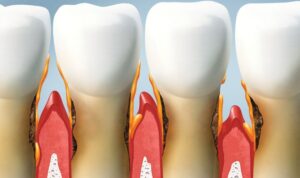It’s often said that the nicest accessory a person can wear is a grin, but what if your teeth are rotting or broken? Dental crowns are useful in this situation. These little dental marvels may restore a broken tooth to its original beauty and functionality. But when is one necessary? We’ll examine dental crowns in more detail in this essay, including their various varieties and the situations in which they are vitally required for oral health. Thus, sit, unwind, and get ready to discover everything there is to know about dental crowns!
What is a dental crown?
A dental crown is a cap in the form of a tooth that fully encloses the weak or damaged portion of a tooth. It may be made from various materials, including metals, ceramics, and porcelain fused to metal (PFM).
The dentist will examine your teeth to see if you require a crown. If you need to repair a big filling or if your tooth has considerable decay or damage, they could suggest it. A crown may also need to be placed on a tooth that is fractured or damaged.
Customers receive a custom dental crown based on their unique dental needs and preferences. The dentist will take impressions of your teeth to guarantee that the crown fits precisely and seems natural in your mouth.
By reinforcing the tooth’s structure, crowns improve the look of damaged teeth and prevent additional damage. They are a long-term, reliable treatment for oral health problems since they may endure for many years with the right maintenance.
Types of dental crowns
A dentist may suggest one of four primary types of dental crowns to their patients.
First, there are ceramic or porcelain crowns, which are the most widely used option because of their ability to blend in with the color and natural appearance of the surrounding teeth. When aesthetics are crucial, these crowns are usually placed on front teeth.
The second type is metal crowns, made from alloys such as gold or silver. Metal crowns offer excellent durability but can be highly visible in the mouth, making them more commonly used on back molars where appearance is less important.
Thirdly, there are crowns made of porcelain fused with metal (PFM), which combines the visual appeal of porcelain with the strength of metal. PFMs provide a solid foundation structure and mix nicely with neighboring teeth.
Another alternative is zirconia or all-ceramic dental crowns, which are more appealing and transparent than any other type of crown now used in dentistry. They are also very durable.
When are dental crowns necessary?
A dental crown is commonly used to repair damaged, discolored, or misshapen teeth. But when is it required to acquire a dental crown?
A dental crown is usually required if you have a tooth significantly damaged by disease or trauma. Sometimes, more than a filling is required to fix the damage and prevent further decay in the tooth. A crown can fortify and cover the damaged tooth to prevent further harm.
Having had root canal treatment is another reason to acquire a dental crown. Your tooth may eventually become weak following this treatment. A dental crown can provide additional strength and defense against future fractures.
Dental crowns can be necessary if you have large fillings in your teeth that need to be replaced. Large fillings can weaken teeth and increase their susceptibility to fractures or fissures.
Dental crowns are an excellent choice if your teeth are severely discolored or distorted and you cannot have veneers or bonding.
Having a dental crown placed is frequently not just a choice but also required to preserve excellent oral health and increase self-confidence with more appealing teeth. This may result from dental decay, an injury, or simple aesthetic problems.
Advantages Of Dental Crowns
Dental crowns are an excellent solution for a variety of dental issues. Because of their numerous advantages, they are a popular choice among patients.
First, dental crowns protect teeth compromised or damaged due to trauma or decay. The crown acts as a shield around the tooth to prevent further damage and minimize discomfort.
Second, dental crowns can improve the look of your smile. Crowns are made to closely resemble the color and shape of your natural teeth, giving them a seamless, natural-looking appearance.
Thirdly, dental crowns can assist in getting your bite back to normal. A crown may assist if you have trouble speaking or eating because teeth are broken or missing. It will improve functioning and realign the teeth.
Dental crowns endure a long time and are strong. They can last up to 15 years with regular upkeep and care before needing to be replaced.
Discussing this option with your dentist if you have any dental problems that could be resolved with a crown is important. The advantages are self-explanatory!
Final Thoughts
In conclusion, dental crowns are a useful fix for various dental issues. They can stop more damage or decay, enhance your oral health, and repair the function and look of teeth that have been harmed.
A dental crown could be required if your tooth is badly decaying, fractured, or damaged and cannot be fixed with a filling or another procedure. It is crucial to speak with your dentist to determine if this is the right course of action for your particular circumstances.
Always remember that prevention is always preferable to treatment when it comes to keeping your mouth healthy. Maintaining proper oral hygiene and seeing your dentist regularly might help minimize the need for major dental procedures like crowns on the road.
Knowing the benefits of dental crowns as a treatment option and, when required, can help you make educated decisions about your oral health and keep your smile looking great for years to come.






